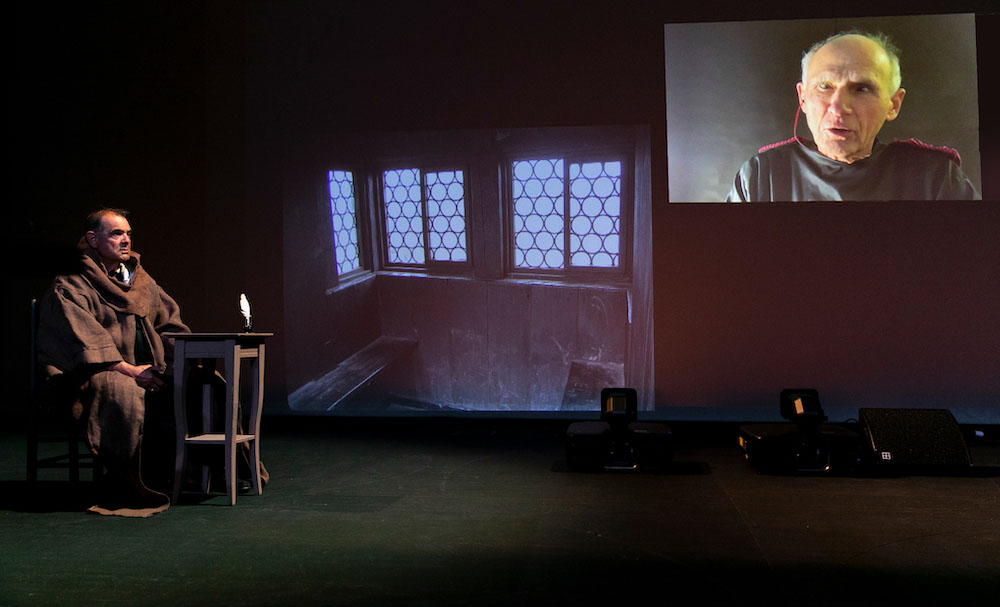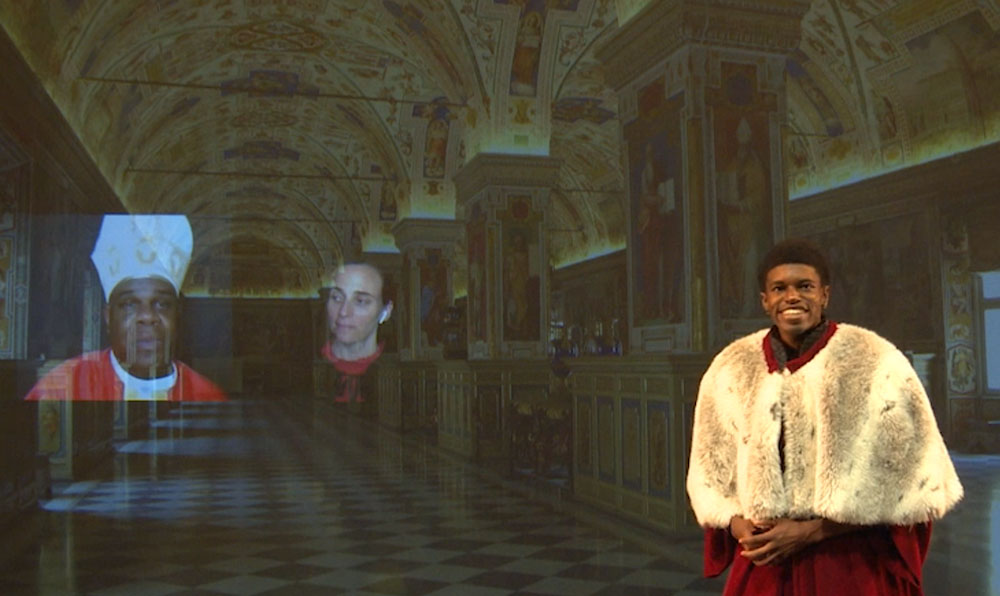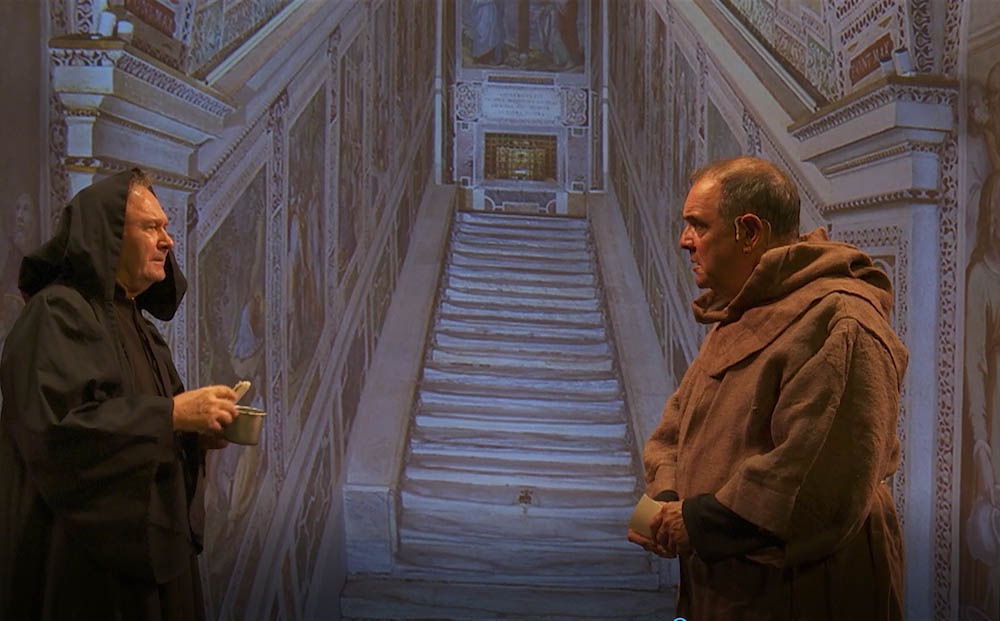“A true believer is never comfortable in his faith,” says Martin Luther in Luther’s Trumpet. Director Rick Davis brings this rousing drama, written by historian James Reston Jr., to the George Mason University’s Center for the Arts in a pioneering digital format. The play itself—centered on Martin Luther’s criticism of and dissent from Catholic Church teaching—provides more than enough intellectual provocation to engage an audience during and after viewing.
The plot of Luther’s Trumpet covers extensive ground and begins by broadly explaining the state of the Catholic Church during Luther’s day: Greedy popes, cardinals, and emperors plot to build monuments to their own glory through the selling of indulgences. When we first encounter Luther, he is on a pilgrimage and is subjected to this scheme. The indignation he feels at the idea of people being charged a fee in order to reduce their time in purgatory, and without any regard to the actual state of their soul, spurs his public dissent from the Catholic Church. The play primarily deals with the fallout of his presentation of The Ninety-five Theses and delves into other topics such as priestly celibacy, the nature of sacraments, and formal heresy. All in all, not quite the lightest fare for anyone looking to unwind and disengage.

Luther’s Trumpet features beloved local powerhouses Edward Gero (Martin Luther) and Craig Wallace (Pope Leo X), bringing them together in a Mason-developed Moving Story Window Wall format. Gero occupies the stage while Wallace is “Zoomed in” to interact with the other actors, both on stage and remotely. While this is still fledgling technology, I believe it will eventually become a standard part of our performing arts landscape. It opens opportunities for actors who may not be able to travel to a location for a show run for whatever reason—be it childcare concerns, disability, or anything else that may impede someone from participating in a production in person. It also provides wider access to great regional talents like Gero and Wallace.
Any small impediments to the performances caused by the new technology don’t detract from the grand scope of the work. Gero does an amazing job as the tentative and conflicted Luther. He conveys, accurately, the pressure that Luther was under and the weight of the misunderstandings that quickly took on a life of their own following Luther’s brash actions in Wittenburg. After all, Luther was seeking not to remove himself from the purview of the Catholic Church but to call out abuses that were occurring and were in need of reform. Wallace as the smarmy, greedy Pope Leo X brings the necessary gravitas to Luther’s actions.

GMU student Hasan Crawford playing, here, the Habsburg monarch Charles V, Holy Roman Emperor, is a notable up-and-coming talent to watch out for. He more than holds his own in his scenes with Wallace and Gero, and I would not be surprised to see him cross paths with either in future productions in a more traditional setting. Another GMU student, Steven Franco, plays the friar Philip. While his early performance seems a bit hesitant, he grows into the role as the production advances. The raw talent is there and I hope he will continue to be encouraged by his professors not to be afraid to lean into it. All other supporting actors and actresses lend their talents to create an overall well-rounded production. GMU easily delivers above and beyond what is typically expected of a university stage in Luther’s Trumpet.
The heart of this play is really centered in the exploration of dissent. This is a vital and relevant topic for many people in religious settings and in our culture. Luther’s Trumpet forces us to consider the divisiveness of dissent and how it sometimes overwhelms the inherent good intentions of that dissent. If you’ve failed to build consensus beforehand and have split the institution you seek to reform, have you succeeded or have you created more problems that will emerge down the road?
Dissent is also a tricky subject within the Catholic Church. One is allowed to dissent, provided that one understands the “what and why” of Church teaching and that one remains open to further personal revelation. I would argue that Martin Luther, as an academic, had a great understanding of Church teaching. From a religious perspective, God eventually vindicates Martin Luther within the structure of the Catholic Church through Pope Adrian VI’s reforms of the practice of indulgences and rebukes of the greed and excesses of the previous pope. This is considered a sign of God’s approval of Luther’s criticism despite the widespread violence that followed in the more radicalized (or politically opportunistic) quarters of the Reformation.

The German Catholic Church still gets a rise out of the Vatican, as we have seen with their recent public blessings of same-sex unions. As Martin Luther claimed to be obedient to the authority of the Catholic Church so too do the bishops in Germany. Only time will tell whether or not God will vindicate them. As Luther’s Trumpet proves, it is up to each person to decide whether it is beneficial to try to remain within an institution that you have real and fundamental disagreements with. For some, this is not an adequate solution to resolve dissent.
Luther’s Trumpet also raises questions about the purpose of good and evil: Is the beauty of St. Peter’s Basilica negated by the underhanded and unholy way that Pope Leo X secured the funds for the reconstruction? When we look at these great works of art and architecture, can we deny the hint of divine influence in them? I am not an apologist for the misbehavior of the Catholic Church, and Luther’s Trumpet lays out a good and accurate case of sympathy for Luther. Truth and beauty have emerged, whether we like it or not, from both the seedy excesses of religious institutions and from the mouths of radicals. Truth is the divine spark with which we create art and show love to others. The “enemy within,” as Martin Luther states, is often the true challenge we must overcome to be able to embody this divine spark in the world and to break down the artificial constructs that separate us from other people—and from God.
Luther’s Trumpet is streaming online for free through June 4, 2021, at 5 pm. Access to the production is available on George Mason University’s Center for the Arts website here. The digital playbill can be viewed here.
SEE ALSO:
Martin Luther to lock horns with the Pope in ‘Luther’s Trumpet’ from GMU




